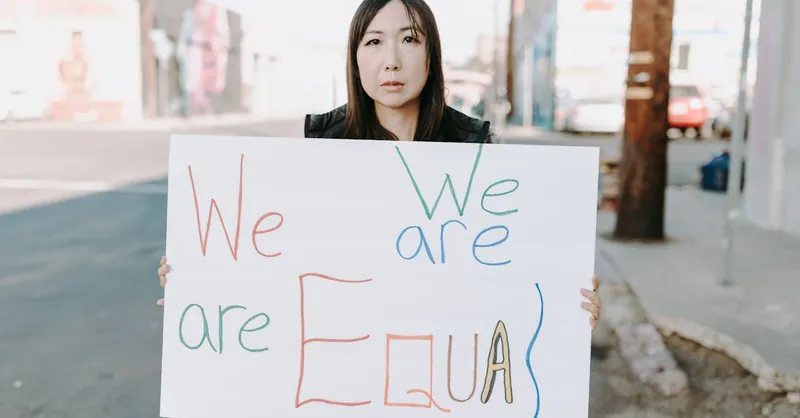Karens Demanding Manager Stories: Entitlement Meets Madness
Category: Social Issues
When Entitlement Turns into Viral Meltdowns: The Rise of Karens Demanding Managers
In today's socially conscious climate, encountering a 'Karen' demanding to speak to the manager is more than a casual anecdote — it’s a reflection of deeper issues around entitlement and fairness in public spaces. If you've landed here, you’re likely familiar with viral Karen stories yet seek a more nuanced understanding of why these incidents captivate and frustrate so many. You might be someone who values social justice and wants to see these disruptive behaviors critically unpacked rather than dismissed as mere internet humor.
This post unpacks some of the most notorious Karens demanding manager stories, looking beyond the surface-level outrage to understand the entitlement culture fueling these encounters, the social dynamics they expose, and the injustice and unfairness they often ignite. Unlike typical retellings, this article offers thoughtful analysis for readers who want to engage critically with these viral moments, helping you recognize patterns and reflect on the broader psychological and societal implications. If you've ever wondered why these stories resonate so deeply or how they mirror systemic issues, you're in the right place. Read on to explore how 'Karen moments' reveal much about social entitlement, conflict, and cultural tensions.
- When Entitlement Turns into Viral Meltdowns: The Rise of Karens Demanding Managers
- What Defines a 'Karen'? Understanding the Archetype and Origins
- The Anatomy of ‘Demanding Manager’ Incidents: Typical Scenarios, Behaviors, and Motivations
- Viral Karens Demanding Manager Stories: Case Studies
- When Entitlement Causes Real Harm: Unpacking Injustice and Unfairness
- The Role of Social Media in Amplifying Karen Meltdowns
- The Intersection of Race, Gender, and Privilege in Karen Stories
- How Businesses and Workers Cope: Strategies for Handling Karen Demands
- Cultural Commentary: What Karens Tell Us About Society Today
- Lessons Learned and How to Foster More Empathetic Social Interactions
What Defines a 'Karen'? Understanding the Archetype and Origins
The term 'Karen' has evolved from a once innocuous name into a potent cultural symbol representing a specific type of entitlement and privilege routinely displayed in public settings. At its core, a Karen is typically characterized as a middle-aged white woman who uses her perceived social status to demand special treatment, often escalating trivial disputes by insisting on speaking to a manager or authority figure. This persona reflects a broader social archetype rooted in entitlement, privilege, and performative indignation.
Origins and Evolution as a Meme and Social Symbol
The Karen archetype gained traction initially through internet memes and viral videos that spotlighted such individuals creating disproportionate conflict in everyday scenarios like retail stores, restaurants, or neighborhood encounters. These snapshots of behavior crystallized into a recognizable stereotype that quickly spread across social media platforms. Over time, the 'Karen' meme evolved beyond humor, becoming a cultural critique of systemic inequalities—exposing how entitlement often intersects with race, class, and gender to perpetuate unfairness.
Key Traits that Define a Karen Persona
- Unwarranted Demands: Expecting exceptions or preferential treatment without valid justification.
- Confrontational Attitude: Aggressively asserting their rights at the expense of others' experiences.
- Reliance on Authority: Frequently demanding to escalate situations by requesting managers or supervisors.
- Lack of Empathy: Demonstrating minimal concern for the impact of their behavior on service workers or marginalized groups.
By understanding the defining features and cultural background of the Karen archetype, we gain valuable insight into why these encounters spark such widespread frustration and how they reveal deeper societal tensions around entitlement and privilege. This foundation is essential for critically assessing viral Karen stories beyond surface-level reactions, enabling a more discerning look at the social dynamics at play.

Image courtesy of Photo By: Kaboompics.com
The Anatomy of ‘Demanding Manager’ Incidents: Typical Scenarios, Behaviors, and Motivations
At the heart of every viral 'Karen demands to speak to the manager' encounter lies a predictable yet revealing pattern of behavior. These incidents often unfold in public settings such as retail stores, restaurants, or service counters, where everyday interactions suddenly escalate due to perceived slights, inconvenience, or unmet expectations. Understanding the anatomy of these episodes not only highlights the recurring dynamics of entitlement but also sheds light on the psychological triggers and social expectations that fuel such confrontations.
Typical Scenarios That Spark ‘Demanding Manager’ Outbursts
Most demanding manager incidents follow a familiar trajectory, frequently involving:
1. Minor service issues or policy enforcement: Whether it’s a refusal to honor a return policy, a delay in service, or health and safety rules, Karens often single out such moments as personal affronts.
2. Perceived disrespect or inconvenience: Even routine reminders from employees or perceived inattentiveness become magnified, triggering disproportionate indignation.
3. Immediate insistence on escalation: Instead of negotiating or seeking resolution calmly, the escalation to management happens swiftly and unnecessarily, reflecting a refusal to engage in mutual respect.
Behavioral Patterns and Psychological Motivations
The behaviors exhibited during these incidents are more than mere frustration; they reveal underlying psychological and sociocultural mechanisms:
- Entitlement as a social script: Many Karens operate from an ingrained expectation of preferential treatment based on social privilege, often racial and socioeconomic.
- Assertion of control and dominance: Demanding a manager symbolizes asserting authority in a context where the individual feels their autonomy or status is challenged.
- Reactance to perceived loss of status: When denied their desired outcome, Karens may experience a psychological threat to their identity, triggering aggressive defense mechanisms.
- Performative indignation: The public nature of these incidents frequently indicates a desire not only to complain but to publicly display grievances as a form of social power or validation.
Social Expectations and Cultural Triggers
The demand to speak with a manager is also entwined with cultural expectations around service encounters and conflict resolution. In many Western societies, consumers are conditioned to believe they hold ultimate power in the service relationship—the “customer is always right” mentality—creating fertile ground for entitlement to flourish. Moreover, the stereotype of the demanding patron is often gendered and racialized, with Karens embodying a specific entitlement grounded in historical and systemic privilege.
By breaking down these typical scenarios and psychological motivations, we gain clearer insight into why Karens insist on escalating conflicts unnecessarily, turning small service inconveniences into public spectacles of injustice. This detailed anatomy helps illuminate how entitlement operates not only as a personal attitude but also as a socially reinforced behavior that perpetuates unfairness and tension in everyday interactions.

Image courtesy of Antoni Shkraba Studio
Viral Karens Demanding Manager Stories: Case Studies
To fully grasp the cultural impact and societal frustrations surrounding Karens demanding managers, it’s essential to examine several viral case studies that have captured widespread attention online. These high-profile stories not only exemplify the typical behavioral patterns outlined earlier but also highlight common elements fueling public outrage and discourse. Through analyzing these viral incidents, we can identify recurring motifs of entitlement, performative aggression, and the amplification of social injustice they provoke.
Case Study 1: The Grocery Store Mask Meltdown
One of the most widely shared Karen moments involved a woman refusing to comply with a grocery store’s mask mandate during the COVID-19 pandemic. When employees requested mask adherence, she erupted into demands to see a manager, claiming her “rights” were being violated. The encounter quickly escalated with her shouting and intimidating staff, which led to viral video circulation.
Common Elements:
- Disregard for public health rules framed as personal freedom demands.
- Aggressive escalation instead of dialogue, portraying entitlement to exception.
- Public shaming and defensive reactions from bystanders amplifying the situation.
The societal reaction reflected broader cultural divides—many sympathized with frontline workers, condemning the Karen’s insistence on special privileges during a public health crisis. This case illuminated how entitlement clashes with community responsibility.
Case Study 2: The Coffee Shop Confrontation
Another viral story featured a customer upset about a seating policy at a busy coffee shop, who demanded a manager after being politely asked to relinquish a table during peak hours. The confrontation included loudly accusing staff of unfairness and discrimination, despite clear signage and reasonable rules.
Key Patterns:
- Assumption of special status above existing policies.
- Public performance of victimhood to gain managerial sympathy.
- Triggering of employee stress and customer disruption.
Public response often highlighted the damaging effects of these encounters on service workers’ well-being, prompting discussions on workplace respect and entitlement boundaries.
Societal Impact of Viral Karen Stories
Across these and similar viral cases, the public reaction tends to polarize, but a consistent outcome is the shining of a spotlight on social privilege and entitlement clashes. These stories go viral because they tap into shared frustrations over unfair treatment but also serve as cautionary tales about the misuse of authority and public disruption. Social media’s rapid dissemination enables these conflicts to become teaching moments about civility, empathy, and the limits of consumer entitlement.
By analyzing these viral Karen stories, readers can better understand how individual acts of demanding management escalate into broader cultural conversations about fairness, power, and social responsibility. This critical lens reveals why such moments resonate far beyond the service counters where they begin, making them key examples for anyone studying entitlement-driven conflicts today.

Image courtesy of Andrea Piacquadio
When Entitlement Causes Real Harm: Unpacking Injustice and Unfairness
The seemingly trivial moments when a Karen demands to speak to the manager often belie a more insidious consequence: these encounters actively reinforce systemic inequities and cause tangible harm to workers and marginalized communities. Beyond mere annoyance or viral entertainment, these incidents become sites where entitlement transforms into injustice, perpetuating social hierarchy and workplace inequality.
The Harmful Ripple Effects on Service Workers and Marginalized Groups
When a Karen lashes out or insists on special treatment, the immediate target is usually frontline employees—often low-wage workers or individuals from marginalized backgrounds. This dynamic reflects and exacerbates structural power imbalances, where those with social privilege weaponize their status to intimidate and diminish others’ dignity. The consequences include:
- Emotional and Psychological Stress: Service employees experience increased anxiety, fear, and burnout, especially when subjected to public shaming or abusive behavior.
- Reinforcement of Racial and Socioeconomic Inequalities: The Karen archetype frequently intersects with racial privilege, disproportionately targeting workers of color, thereby perpetuating systemic discrimination in workplaces.
- Undermining Workplace Policies and Equity Initiatives: By demanding exceptions that cater exclusively to their desires, Karens disrupt rules designed to ensure fairness, creating a precedent where rules become negotiable for the privileged few.
Entitlement as a Mechanism of Social Injustice
These confrontations are not isolated incidents; they mirror broader societal patterns where entitlement serves as a tool to preserve social dominance. When Karens demand managers and use their perceived authority to override rules or silence dissent, they perpetuate a culture where fairness is conditional, and marginalized voices are sidelined. This dynamic:
- Normalizes aggressive behavior towards workers, making such encounters a routine burden rather than exceptional disruptions.
- Undermines collective efforts to build equitable environments by validating the idea that certain individuals merit exceptions due to their identity or social standing.
- Perpetuates injustice by amplifying unequal access to power, resources, and respect within public and commercial spaces.
Recognizing the harm caused by entitlement-fueled manager demands is crucial for challenging the normalization of harassment and inequity in everyday interactions. It also underscores the importance of supporting service workers and advocating for systemic changes that limit the impact of such abuses of privilege. In this light, viral Karen moments become more than embarrassing episodes—they are symptomatic flashpoints revealing entrenched social injustices demanding serious critique and action.

Image courtesy of Yan Krukau
The Role of Social Media in Amplifying Karen Meltdowns
Social media platforms have played a pivotal role in magnifying Karen meltdowns, transforming private moments of entitlement into viral spectacles with global reach. Sites like Facebook, Twitter, Instagram, and especially TikTok thrive on sharing shocking, entertaining, and conflict-driven content, making Karen incidents prime material for widespread dissemination. This viral sharing culture not only exposes these behaviors to broad audiences but also fuels public shaming, turning individual encounters into cultural phenomena.
How Social Media Encourages Viral Sharing and Public Shaming
- Instant virality and widespread exposure: A single video clip of a Karen demanding a manager can amass millions of views within hours, propelled by algorithms that favor engagement through outrage and drama.
- Public shaming as social currency: Users flock to comment, repost, and meme-ify these incidents, reinforcing social norms against entitlement while sometimes crossing into mockery or harassment. This dynamic can both hold Karens accountable and dehumanize individuals involved.
- Echo chambers intensify reactions: Online communities with shared social justice values or anti-entitlement stances amplify outrage, fostering collective condemnation but occasionally overshadowing nuanced discourse.
The Cultural Fixation on Karen Incidents and Its Consequences
The constant cycle of posting and reposting Karen moments has fostered a cultural obsession with entitlement-driven conflicts. While this can serve to highlight persistent social injustices, it also has unintended consequences:
- Inflaming conflicts rather than resolving them: Viral exposure can escalate tensions by encouraging Karens to perform entitlement theatrics for audience attention, sometimes worsening behavior to “up their viral potential.”
- Perpetuating stereotypes and reductive labels: The Karen archetype, amplified by social media, risks simplifying complex social behaviors into caricatures, which can hinder deeper understanding of systemic issues underpinning entitlement.
- Desensitization to genuine injustice: The repetitive cycle of viral Karen footage may numb viewers to more serious forms of discrimination and abuse experienced by marginalized groups, diluting the impact of social justice advocacy.
Ultimately, social media acts as both a megaphone for accountability and a magnifier of conflict, shaping how entitlement and managerial confrontations are perceived and discussed in contemporary culture. Recognizing this dual role is essential for anyone seeking to engage critically with Karen stories beyond viral sensation—encouraging balanced reflection rather than reactive outrage.

Image courtesy of Markus Winkler
The Intersection of Race, Gender, and Privilege in Karen Stories
The Karen phenomenon cannot be fully understood without examining how race, gender, and privilege intersect to shape both the behavior of Karens and public responses to their actions. At its core, the Karen archetype is deeply embedded in systemic inequalities that grant certain demographics—primarily middle-class white women—a disproportionate sense of entitlement and access to authority in public spaces. This intersectionality dramatically influences incidents where Karens demand managers, revealing broader implications for social justice discourse and power dynamics.
How Identity Shapes Karen Behavior and Public Perception
-
Race and Racial Privilege:
Many Karen stories prominently feature white women leveraging their racial privilege to intimidate or control workers of color, especially in service roles. This dynamic often recalls historical patterns of racial surveillance and policing, where white entitlement enforces social hierarchies. The viral nature of these encounters underscores the racial tensions underlying everyday interactions, highlighting how entitlement is not race-neutral but frequently tied to white supremacy and systemic bias. -
Gender and Societal Expectations:
The archetype of a Karen is largely gendered, focusing on women who exploit gendered perceptions of authority, politeness, and victimhood. Some Karens weaponize societal assumptions that women are more “reasonable” or entitled to special consideration, while others perform aggression that contrasts with traditional expectations of feminine behavior. This tension reveals how gender norms both constrain and empower entitlement, complicating the cultural narrative around assertiveness and disruption. -
Class and Socioeconomic Factors:
The Karen stereotype often maps onto class privileges—those with financial means or perceived social status feel empowered to demand managerial attention and exceptions to rules. This class dynamic accentuates the sense of entitlement as a form of privilege, reinforcing barriers that marginalize lower-income individuals who lack the same social capital to influence service encounters or circumvent policies.
Broader Implications for Social Justice Conversations
Recognizing the intersectional nature of Karen incidents is crucial for advancing nuanced social justice discussions. These stories expose how entitlement is a layered social construct tied to identity-based power, not simply a matter of poor manners or isolated behavior. Addressing Karen moments involves:
- Challenging how racial and gender privileges enable and shield entitled behavior from accountability.
- Highlighting the disproportionate impact of these encounters on marginalized workers and communities.
- Avoiding reductive labels that obscure the systemic context, instead fostering critical dialogue about how societal structures sustain entitlement and injustice.
By unpacking the intersection of race, gender, and privilege in Karen stories, we move toward understanding these viral spectacles as manifestations of larger societal inequities. This foundation empowers readers to critically engage with entitlement beyond individual episodes—viewing them as reflections of entrenched social hierarchies that demand collective awareness and action.

Image courtesy of RDNE Stock project
How Businesses and Workers Cope: Strategies for Handling Karen Demands
Facing the brunt of Karen demands places immense stress on both service workers and businesses, necessitating well-developed strategies to manage entitlement-driven conflicts effectively. From the frontline employee level to corporate policy, many organizations now prioritize conflict management and de-escalation techniques that protect staff wellbeing while restoring order and fairness in customer interactions. Understanding these strategies is essential—not only to mitigate the immediate disruption caused by entitled customers but also to address the broader culture of entitlement that fuels these encounters.
De-Escalation Techniques for Frontline Workers
Service workers often bear the direct impact of Karen meltdowns, so empowering them with de-escalation tools is critical. Common techniques include:
- Active Listening and Empathy: Acknowledging the customer’s feelings without necessarily agreeing helps reduce tension by making the individual feel heard.
- Calm, Measured Responses: Maintaining a steady tone and controlled body language prevents escalating emotional reactions from the customer.
- Setting Clear Boundaries: Politely but firmly reiterating store policies or safety protocols signals professionalism and limits the scope for arbitrary exceptions.
- Offering Alternatives: Proposing solutions or compromises—even if limited—can redirect focus from confrontation to problem-solving.
- Knowing When to Escalate: Workers must recognize when escalation to management is warranted to protect themselves and uphold policy, while ensuring escalation is controlled and constructive rather than reactive.
Training employees in these methods enhances conflict resilience, helping to defuse entitled demands before they escalate into viral confrontations or workplace harassment.
Business-Level Policy Responses
On an organizational scale, businesses adapt policies to both deter and manage Karen-type behavior while supporting employee safety and institutional fairness. Effective policy responses often include:
- Clear Code of Conduct Policies: Explicit behavioral expectations for customers and consequences for abusive behavior create a framework to challenge entitlement firmly and fairly.
- Managerial Support Structures: Managers trained in conflict resolution can intervene early and assertively, reducing the burden on frontline workers.
- Communication and Signage: Transparent communication of policies, whether regarding returns, health guidelines, or seating rules, reduces misunderstandings that often trigger demands.
- Empowerment to Enforce Policies: Giving employees and managers authority to refuse service or remove abusive customers reinforces respect and diminishes repeated entitlement violations.
- Mental Health and Support Resources: Offering counseling and support acknowledges the emotional toll of dealing with hostile customers, promoting worker wellbeing and retention.
By integrating these strategies, businesses create an environment less susceptible to the disruption caused by entitled customers and build a culture of mutual respect between staff and patrons.
Navigating the Balance: Customer Service vs. Boundaries
A critical challenge in handling Karen demands lies in balancing the customer service ideal—“the customer is always right”—with the necessity to enforce boundaries and uphold fairness. Effective management requires rejecting entitlement-fueled exceptions without alienating genuine customers. Strategies that emphasize respect for all parties, clear communication, and consistent policy enforcement not only curb Karen behavior but also foster healthier service environments conducive to fairness and equity.
In sum, the combination of frontline de-escalation, comprehensive business policies, and a commitment to employee support equips organizations to confront the challenges posed by Karens demanding managers. These approaches are vital for mitigating entitlement-driven conflicts that otherwise perpetuate injustice and undermine workplace dignity.

Image courtesy of Pavel Danilyuk
Cultural Commentary: What Karens Tell Us About Society Today
The phenomenon of Karens demanding to speak to managers offers more than just viral entertainment—it acts as a cultural barometer reflecting the growing entrenchment of entitlement culture and social frustration in modern society. At its core, these behaviors reveal a dangerous mindset where individual desires and perceived rights are elevated above collective norms, rules, and empathy toward others. This entitlement culture often manifests as a demand for instant gratification and exceptional treatment, rooted in broader issues of privilege, power imbalance, and social alienation.
Entitlement Culture and Its Societal Roots
Karens exemplify how entitlement operates as a social script, consistently prioritizing one’s personal convenience or status over fairness and respect for institutional policies. This attitude is frequently reinforced by a consumerist mindset prevalent in many Western societies, where customers are conditioned to believe they wield ultimate authority in service relationships. However, these encounters expose the limits and contradictions of the “customer is always right” ideology, demonstrating how unchecked entitlement fosters conflict, undermines social trust, and damages communal cohesion.
Broader Social Frustrations and Power Dynamics
Beyond entitlement, Karen outbursts tap into wider societal frustrations stemming from economic uncertainty, social inequality, and cultural polarization. When individuals feel powerless or marginalized in various aspects of life, some seek control through public displays of dominance—often at the expense of lower-status workers and vulnerable populations. These moments of verbal aggression and insistence on managerial escalation serve as symbolic exercises of authority and privilege, compensating for feelings of insecurity or disenfranchisement.
Reflection of Social Hierarchies and Cultural Tensions
Karen incidents unveil the persistence of social hierarchies that favor certain identities based on race, gender, or class, perpetuating systemic inequalities in everyday interactions. The fact that these stories resonate so widely indicates collective recognition of these entrenched disparities, sparking conversations about power, justice, and respect in public life. Furthermore, the viral nature of these episodes exposes cultural tensions around civility, entitlement, and accountability—highlighting the challenge societies face in balancing individual rights with social responsibility.
By critically examining Karens demanding managers, we gain insight into how entitlement, societal frustration, and intersectional privilege converge to create conflict-prone social environments. These stories serve as cultural touchstones that urge reflection not only on personal behavior but also on the underlying systemic conditions that enable such entitlement to thrive. Understanding this broader context is essential for fostering a more equitable, respectful, and just social landscape where no one’s sense of privilege undermines the dignity of others.

Image courtesy of Antoni Shkraba Studio
Lessons Learned and How to Foster More Empathetic Social Interactions
Understanding the entitlement-driven conflicts embodied by Karens demanding managers offers crucial insights into how we can reduce these confrontations and promote fairness and respect in everyday interactions. At the heart of these lessons lies the importance of cultivating empathy, clear communication, and accountability both at the individual and community levels. Recognizing that entitlement often stems from deeper social insecurities and privilege enables a shift from reactive confrontation toward constructive dialogue and mutual understanding.
Recommendations for Individuals
- Practice Active Empathy: Before escalating a conflict, try to understand the perspectives of service workers who often navigate challenging situations. Empathy breaks the cycle of entitlement by humanizing all parties involved.
- Reflect on Entitlement Triggers: Identify when personal expectations may be unreasonable or fueled by privilege. Self-awareness can prevent demands from becoming disproportionate or harmful.
- Choose Calm Conflict Resolution: Approaching disagreements with patience and respect rather than immediate demands to speak to management fosters cooperative problem-solving.
- Respect Established Policies: Acknowledging that rules are often designed to ensure fairness and safety helps reduce unnecessary escalation. If exceptions are requested, framing them politely and without entitlement encourages better outcomes.
Strategies for Communities and Organizations
- Promote Empathy Education: Incorporating empathy and social awareness training in schools, workplaces, and public campaigns can build emotional intelligence that counters entitlement mindsets.
- Encourage Public Accountability Without Shaming: While viral Karen stories highlight entitlement, communities should advocate for accountability that emphasizes growth and understanding rather than humiliation, which can entrench defensive behaviors.
- Foster Inclusive Spaces: Creating environments where diverse voices are respected and power imbalances are addressed diminishes the social privilege that often underpins entitlement.
- Support Frontline Workers: Offering protections, mental health resources, and empowerment to service workers reinforces fairness and resilience against entitlement-fueled abuse.
- Model Positive Conflict Resolution: Leaders and public figures demonstrating respectful ways to address grievances set cultural expectations that discourage entitlement and encourage productive dialogue.
By embracing these approaches, individuals and communities can disrupt the cycle of entitlement, conflict escalation, and injustice that characterize Karen incidents. Moving toward a culture grounded in empathy and equity not only mitigates unfair demands but also advances social cohesion and respect for all members of society. Ultimately, fostering empathetic social interactions is a powerful antidote to the disruptive entitlement exemplified by Karens demanding managers.

Image courtesy of Timur Weber
